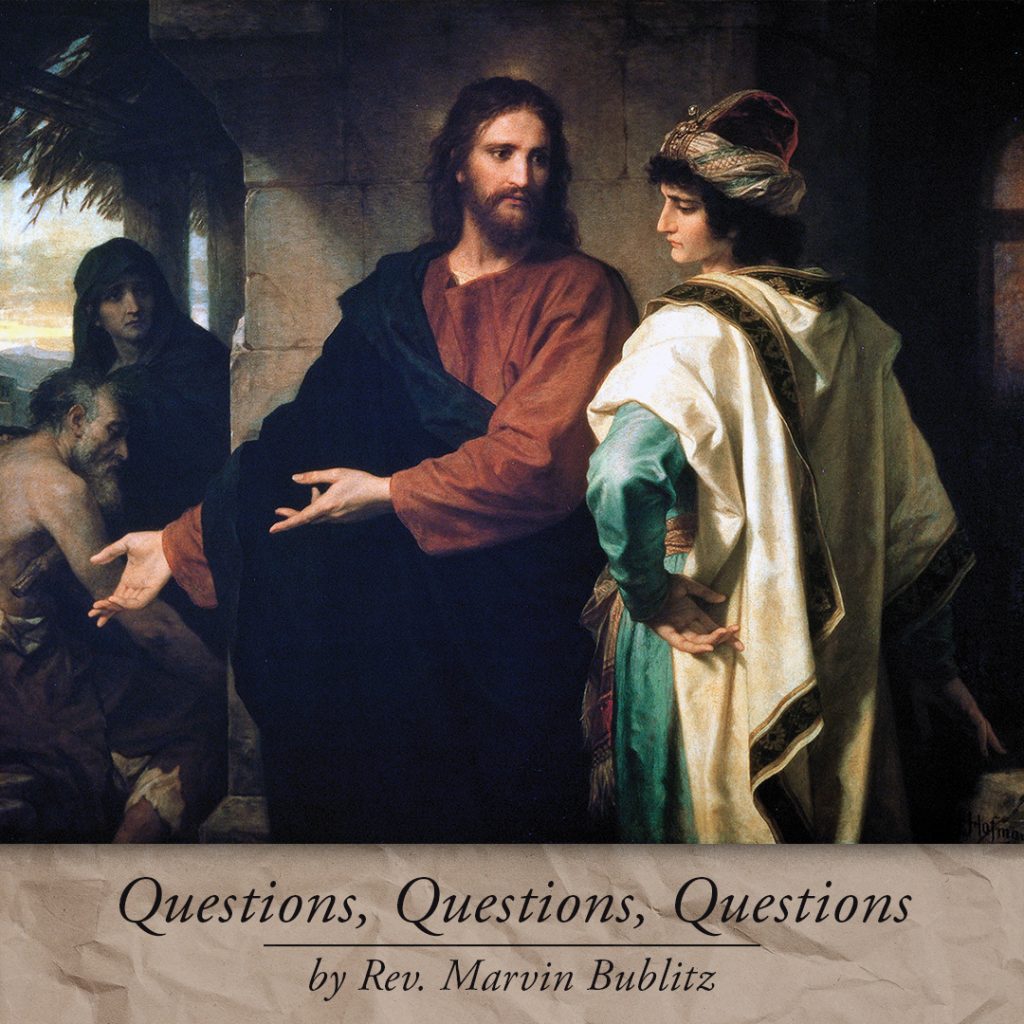Questions, Questions, Questions
 by Marvin Bublitz
by Marvin Bublitz
It seems that very often there are a flood of questions which come your way. An interesting thing about questions though is that sometimes they can reveal more about the person asking them than the answers do. Sometimes the questions people ask are less of an attempt to gain information than they are a revealing statement about what those people think—and an attempt to get others to support their position.
Consider some of the questions asked in Holy Scripture. When Cain was confronted by the Almighty regarding his brother, Abel, Cain asked: “Am I my brother’s keeper?” (Genesis 4:9). Cain sought to cover his misdeed by deflecting with a question.
Then there was the time the rich young man approached Jesus and asked, “What must I do to inherit eternal life?” (Mark 10:17). In his question he revealed that he thought eternal life was something he could earn on his own. He came at Jesus with a Law question. But salvation is of the Gospel. It is God’s gift—His work. All who seek to earn their salvation will forever go away sad, like that rich young man.
But salvation is of the Gospel. It is God’s gift—His work.
Even the disciples of Jesus revealed their heart at times in their questions. “Rabbi, who sinned, this man or his parents, that he was born blind?” (John 9:20). It must be someone’s fault, they reasoned. And another time they asked Him: “Who is the greatest in the kingdom of heaven?” (Matthew 18:1). Jesus still had more to teach those closest to Him.
What about us? What does Jesus need to teach us?
The two questions asked most of me are these: “Who is in charge here?” and “Whose fault is it?”
Let’s examine those questions and see what they reveal. When someone asks who is in charge, it is often more of a statement. Usually, it is asked when there is conflict. It reveals the heart. It is not so much a question as a declaration that the one asking feels they are in charge and simply want me to confirm that.
But there is really only one answer to the question of who is in charge: the Church belongs to Jesus. He is the Lord of the Church.
Let’s look at that other common question: “Whose fault is it?” Who’s to blame?” We want to blame someone, anyone, just as long as it is not us.
When you consider these questions, I encourage you to consider the source. Consider who is really asking the question, and who is answering. Is it the Old Adam or the New Man in Christ? If the Old Adam—our sinful nature—is asking who is in charge, then it becomes an attempt to exert power and control over the situation. And if the Old Adam is answering the question, then the answer becomes another way to try to wrestle control away from others.
Consider who is really asking the question, and who is answering. Is it the Old Adam or the New Man in Christ?
If, on the other hand, the New Man in Christ is asking who is in charge, he or she is trying to redirect everyone’s thoughts to Christ—to remind everyone that it is Jesus who is in charge. It is more of a rhetorical question. Who is in charge? The New Man in Christ answers: “Clearly, the Lord is in charge!”
In the same way, we should consider who is asking whose fault it is. The Old Adam asks this question in order to redirect blame to others. And the Old Adam answers the question with more deflection: “Who’s to blame? Surely anyone but me!” It’s like Judas asking the Lord: “Is it I?”
But the New Man in Christ confesses his or her own sin. “It is my fault, my own fault, my own most grievous fault.” Then he or she turns to Christ for forgiveness and the removal of the guilt and sin of the Old Adam within.

So, before you ask a question, first ask yourself who is asking. Is it the Old Adam within me or is it the New Man in Christ? This is the self-examination we each must undertake. Too often sin is crouching at our door desiring to have us. And so daily we must return to our Baptism and the drowning of the Old Adam, in order that the New Man in Christ may arise anew.
———————
Rev. Marvin Bublitz is Lutheran Church–Canada (LCC)’s East Regional Pastor.
Cover Photo: “Christ and the Rich Young Ruler,” edited, by Heinrich Hofmann, 1889





